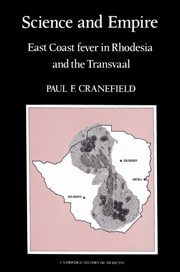Book contents
- Frontmatter
- Contents
- List of illustrations
- Preface
- Acknowledgments
- 1 Prologue
- 2 The places and the players
- 3 A new disease?
- 4 The search for an expert
- 5 Robert Koch in Bulawayo
- 6 Joseph Chamberlain
- 7 Arnold Theiler, Charles Lounsbury and Duncan Hutcheon
- 8 The fight against East Coast fever
- 9 The African-owned cattle in Rhodesia
- 10 Two more parasites and another new disease
- 11 What is East Coast fever?
- 12 Epilogue
- Notes and references
- Index
1 - Prologue
Published online by Cambridge University Press: 19 January 2010
- Frontmatter
- Contents
- List of illustrations
- Preface
- Acknowledgments
- 1 Prologue
- 2 The places and the players
- 3 A new disease?
- 4 The search for an expert
- 5 Robert Koch in Bulawayo
- 6 Joseph Chamberlain
- 7 Arnold Theiler, Charles Lounsbury and Duncan Hutcheon
- 8 The fight against East Coast fever
- 9 The African-owned cattle in Rhodesia
- 10 Two more parasites and another new disease
- 11 What is East Coast fever?
- 12 Epilogue
- Notes and references
- Index
Summary
Almost all of the cattle in Rhodesia died in 1896: “total annihilation of the cattle by rinderpest – no milk, no beef in a few days – but lots of lovely smells from dead cattle.” Thus Earl Grey, writing to his son from Bulawayo, Rhodesia, May 8, 1896.
Less than six years later, after a slow and costly replacement of the cattle that had been wiped out by rinderpest, another almost invariably fatal disease of cattle broke out in Rhodesia. Originally thought to be a virulent form of an already well-known disease, Texas fever or redwater, it was, in fact, a disease never before seen in Rhodesia, a disease unknown to veterinary science, a disease that we now call East Coast fever.
Stanley Portal Hyatt, who made a living by operating ox-drawn wagon trains, and who was bankrupted by the death of his oxen, later wrote:
Rinderpest was the Act of God. The spread of African Coast Fever was due entirely to the criminal folly of men … The Chartered Company's government was bombarded with requests, prayers, petitions to take prompt measures… The only answer was… that the plague did not exist … the reason was obvious – Rhodes had just died, and to admit the existence of a new cattle disease would have sent down Rhodesian shares.
Months afterwards, when all the cattle on the high veld were dead, the government found itself compelled to admit that mistakes had been made … I attacked them so strongly in the columns of one of the great London financial dailies, that they were compelled to do something.[…]
- Type
- Chapter
- Information
- Science and EmpireEast Coast Fever in Rhodesia and the Transvaal, pp. 1 - 6Publisher: Cambridge University PressPrint publication year: 1991

